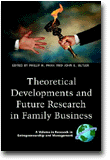
Theoretical Developments and Future Research in Family Business
Edited by:
Philip Phan, Rensselaer Polytechnic Institute
John E. Butler, Hong Kong Polytechnic University
A volume in the series: Research in Entrepreneurship and Management. Editor(s): John E. Butler, Hong Kong Polytechnic University.
Published 2008
Until recently, research in family business has been confined to a sub-group of entrepreneurship scholars, labor economists, and sociologists. Family business employment is often the only economic option available to migrants, the first entrepreneurial experience for young people, and a source of an economy's new business creation activities. These issues are typically framed in terms of the generational transfer of wealth, management succession, or the interplay between the economic system of a family and its sociopolitical system. The phenomenon is clearly widespread but for some reason continues to be poorly understood.
We believe that progress on the empirical front has been hampered by a lack of accepted theoretical frameworks. For example, attempts to employ agency theory, geographic agglomeration and spill overs, social networks, sense making, bargaining and other frameworks have been scattered. In our view, the extant research has not created the theoretic ballast that can withstand repeated empirical verification. More fundamentally, researchers are beginning to ask, "Is family business theoretically distinctive or a convenient phenomenon for exploiting familiar theories with new data?"
We believe the time is ripe for a focused look at the theoretical history and prospects of family business research. Review articles grounded in economics, sociology, psychology and political economy and that offer multidisciplinary implications are especially sought. Theory based empirical papers are also welcomed. We believe that there are exciting opportunities for theory development and so encourage authors to focus on this in their submissions. In sum, the focus of this volume is on showcasing and advancing the latest research in family business.
CONTENTS
Introduction: Wither the Family Enterprise? Suggestions for Future Research, Phillip H. Phan and John E. Butler. PART I. GENERAL APPROACHES TO CONCEPTUALIZING THE FAMILY ENTERPRISE. Analyzing the Dearth in Family Enterprise Research, Susan Clark Muntean. No Family is an Island: A Social Network Approach to Governance in Family Firms, Mattias Nordqvist and Sanjay Goel. Heroes and Villains: Ethnic Chinese Family Business in Southeast Asia, Michael Carney and Marleen Dieleman. PART II. DYNAMIC MODELS OF THE FAMILY ENTERPRISE. An Experimental Examination of the Fits Family-Business Model: New Insights From a Simulation Study Through System
Dynamics, Francesco Chirico and Gianluca Colombo. Strategic Planning and Organizational Integrity in Family Firms: Drivers for Successful Postintegration
Outcomes in M&A Procedures, Rosa Nelly Trevinyo-Rodríguez. Exit Preferences in Family Businesses, Soo-Hoon Lee, John E. Butler, and Borje O. Saxberg. PART III. SUCCESSION AS A CORE INSTITUTION IN FAMILY ENTERPRISES. Family Involvement in Family Firms: Antecedents and Moderators, Hung-Bin Ding. Make or Buy? The Invisible Hand Behind Hiring Decisions of Family Firms, Hung-Bin Ding and Soo-Hoon Lee. Offspring Intentions to Join the Family Business: Does Culture Make a Difference? Eleni Stavrou, Anna Merikas, and George S. Vozikis. Performance Lags and Gaps During Family Business Succession: The Dual Inefficiency of Succession Discontinuity and Lower Initial Postsuccession Performance, Christos R. Sigalas, George Chondrakis, Anastasios Zaharopoulos, and George S. Vozikis. A Theoretical Framework on the Role of HRM Practices in Family Business Succession, Soo-Hoon Lee. About the Contributors.
-
Paperback978-1-59311-551-7
Web price: $45.04 (Reg. 52.99)
-
Hardcover978-1-59311-552-4
Web price: $80.74 (Reg. 94.99)
- eBook9781607525769

- BUS041000 - BUSINESS & ECONOMICS: Management
- BUS070000 - BUSINESS & ECONOMICS: INDUSTRIES: General
- BUS030000 - BUSINESS & ECONOMICS: Human Resources & Personnel Management
-
 Dark and Destructive Leadership
Dark and Destructive Leadership
-
 Diversity, Equity, and Inclusion Insights in Practice
Diversity, Equity, and Inclusion Insights in Practice
-
 E-Commerce & Entrepreneurship
E-Commerce & Entrepreneurship
-
 New Perspectives on Women Entrepreneurs
New Perspectives on Women Entrepreneurs
-
 Opportunity Identification and Entrepreneurial Behavior
Opportunity Identification and Entrepreneurial Behavior
-
 Technological Entrepreneurship
Technological Entrepreneurship
-
 Venture Capital in the Changing World of Entrepreneurship
Venture Capital in the Changing World of Entrepreneurship

